Select Language
Home / Dental Treatments / Pediatric Dentistry
Pediatric Dentistry
Are you searching for an expert and friendly dentist for kids in Nicosia, Cyprus?
Talk to our experienced pediatric dentists at Smalto Dental Clinic, dedicated to helping children from infancy through childhood and teenage years to achieve healthy teeth and a lovely smile!
Our clinic offers a child-friendly atmosphere and an outstanding dental care experience, making your child feel safe, secure and happy. Our purpose is to take away any fear or stress kids may feel about dentists and educate both parents and children on good oral hygiene habits.
Start your child’s dental visits early to ensure they learn how to properly care for their teeth and maintain optimal oral health for years to come. Our pediatric dentistry services include:
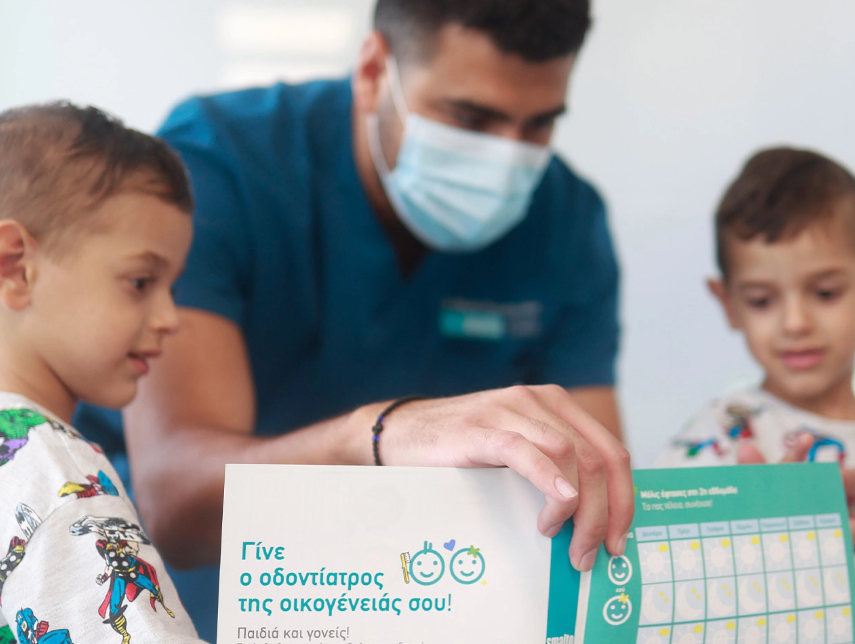
Smalto Dental Clinic is staffed by experienced dentists, child dentists as well as dental assistants, who are eager to provide you with excellent services.
Moreover, the Smalto premises have created a specially designed space for children, to help them relax and trust the professionals.
Call us today and take the first step to a
healthier, more beautiful smile!

The best dental protection for children is prevention. Most children have their first teeth around 6 months old, while they should have all their milk teeth by age 3. Around the age of 6, milk teeth are replaced by permanent teeth.
Most dentists recommend that the child’s first visit to the pediatric dental clinic takes place between the age of 1-2. That’s because the first visit of a child to the dentist should not be associated with pain, but be a friendly visit where they will meet and greet each other. Thus, it is important to forge a relationship of trust between the parent, the child and the dentist at an early age.
To help your children establish a smooth brushing routine, download the BRUSHING CALENDAR by Smalto Dental Clinic Nicosia. You can use it to draw with your children and bring it with you to your next appointment so that we can talk about it together.
At Smalto Dental Clinic, our specialized baby and kids dentists offer all kinds of dental treatment to provide your children with excellent oral health from the first years of their life. Our friendly dental professionals will make your kids feel at home.
During the appointment, the dentist can examine your child on your lap if this will make them feel more relaxed. You will also be briefed on dental decay prevention, the importance of milk teeth, healthy eating habits, and the effects of bad nutrition on oral health.
The goal of the first visit is to expose the child to the dental environment and get to know our pediatric dentists and personnel. We want children to feel comfortable receiving dental care and encourage you and your child to ask questions or discuss your dental concerns with us.
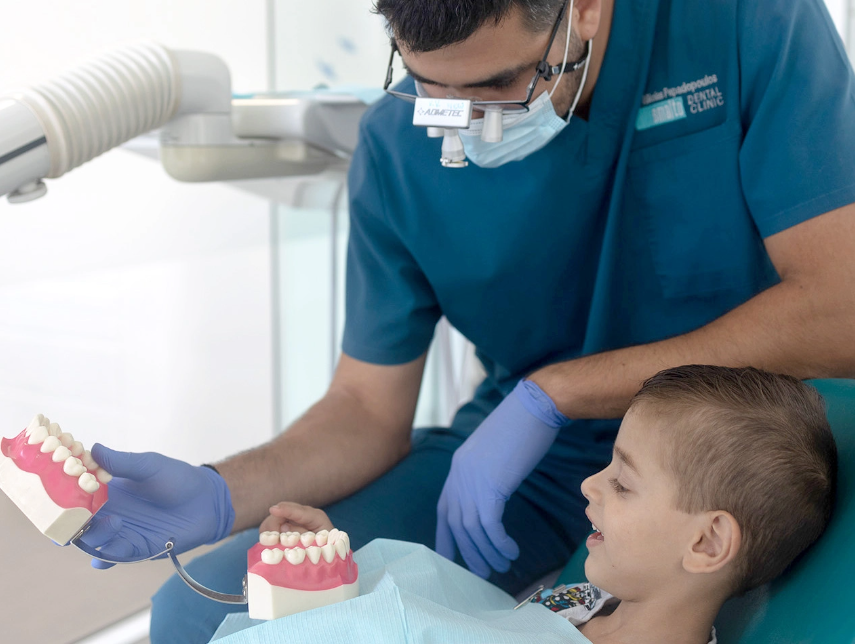
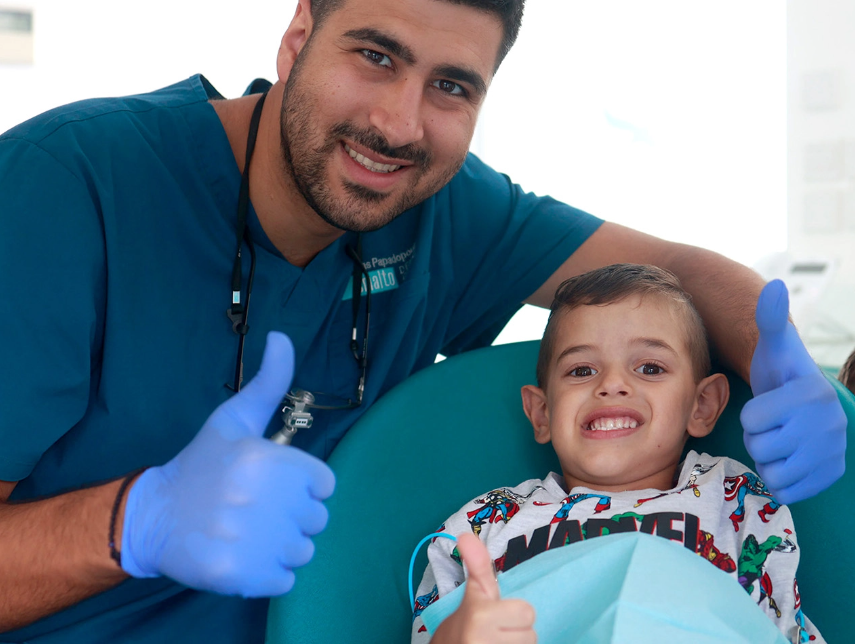
At the next appointment, our dentist will perform a thorough dental examination that may include the following:
Our children’s dentists offer outstanding oral health care, including tailored care for children with medical, physical, psychological, emotional, or intellectual difficulties . Everyone is welcome at Smalto Dental Clinic!
When our children reach the age of having to brush their teeth, it often feels like an impossible task! It is a battle we have to fight twice a day and one which sometimes ends in both parties screaming.
But it doesn’t have to be that way! Imagination and patience can help teach your children to brush their teeth in fun ways until they are mature enough to understand the importance of brushing them correctly. Parents’ systematic commitment to this procedure, guarantees that their children will also see it the same way.
Especially between the ages of 6 and 36 months, parents often have to deal with symptoms such as irritability, pain, increased saliva, itching gums, or even fever, all due to growing teeth. In these cases, special toys, gels and a light massage can be very comforting for the child.
Use Of The Feeding Bottle
Letting children fall asleep while they are using the feeding bottle means they are continuously exposed to sugar or honey contained in milk or juice.
This increases the production of acids which are to blame for one of the most serious types of tooth decay in children, that can destroy the teeth in a very short time. Hence, the feeding bottle must be used appropriately and, under no circumstances, must it be used as a pacifier.

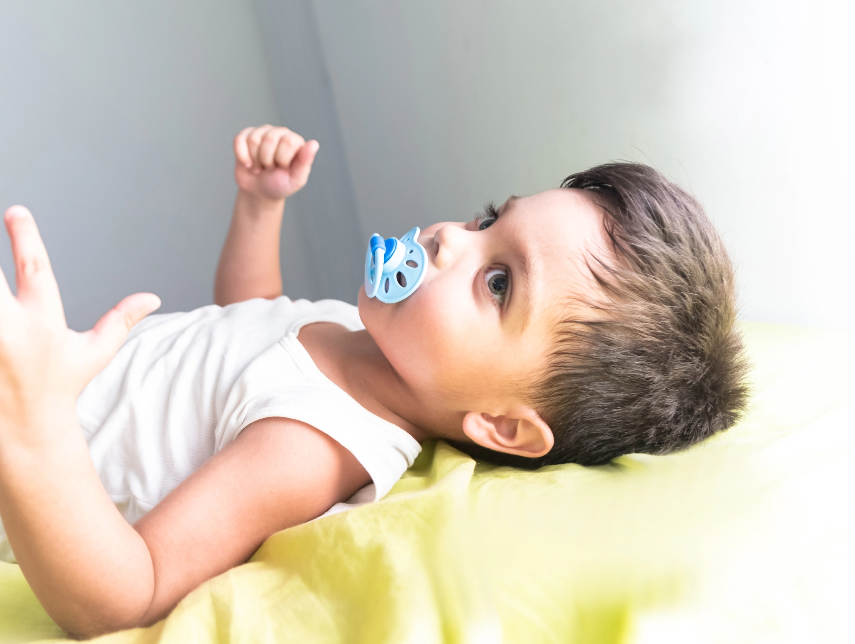
Pacifiers and thumb sucking are both common habits among infants and young children. They provide comfort and can help calm a fussy or upset child. However, prolonged use of pacifiers or thumb sucking can have negative effects on dental health and speech development.
More specifically, thumb sucking and pacifiers can lead to serious jaw malformation; thus, they must be terminated around 3 to 4 years old. Their use after this age can lead to serious orthodontic problems, including open bites, cross bites, protruding teeth, etc.
If you have difficulty helping your child stop thumb sucking, the Smalto orthodontist can help you with a custom-made device. It is important to note that eliminating those habits early allows for the timely correction of any malformation in the child’s teeth or jaw.
Does your child refuse to stop thumb sucking? Reach out to Smalto Dental Clinic in Nicosia and our expert pediatric dentist will assess your child’s dental health and provide step-by-step guidance on how to address the habit.
Brushing teeth is an essential habit to instill in children for good oral hygiene.
Besides brushing, other healthy oral hygiene habits for children include flossing daily, limiting sugary foods and drinks, and visiting the dentist regularly for checkups and cleanings.
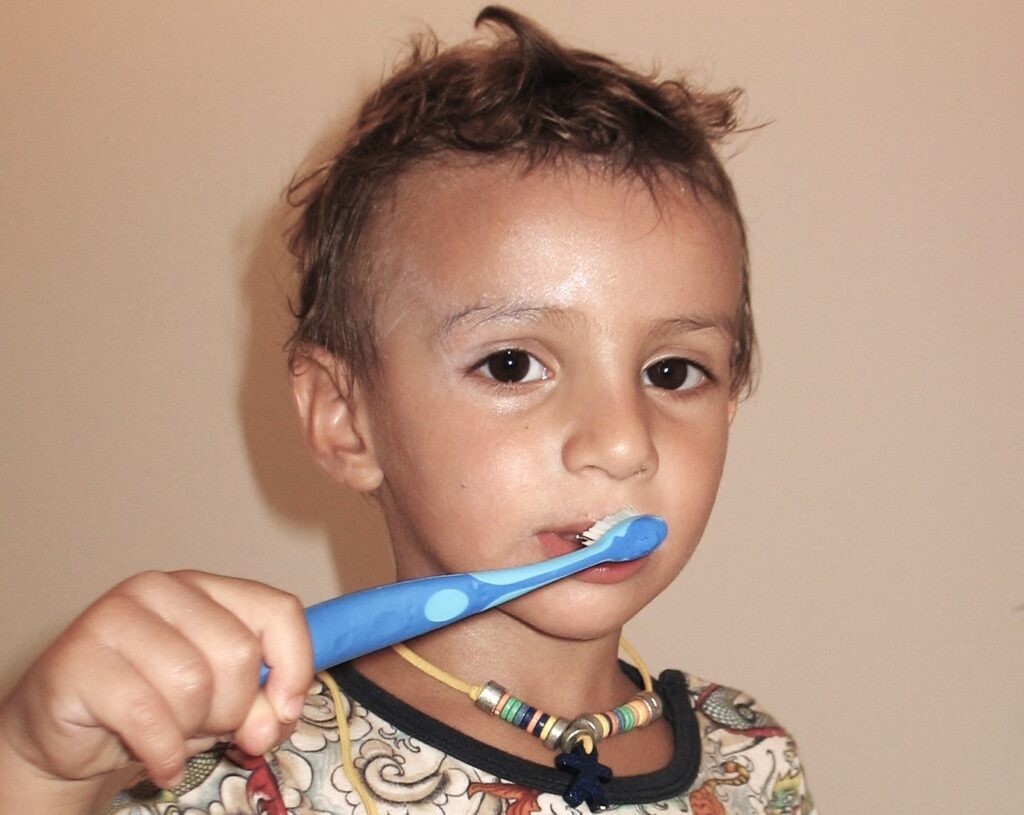
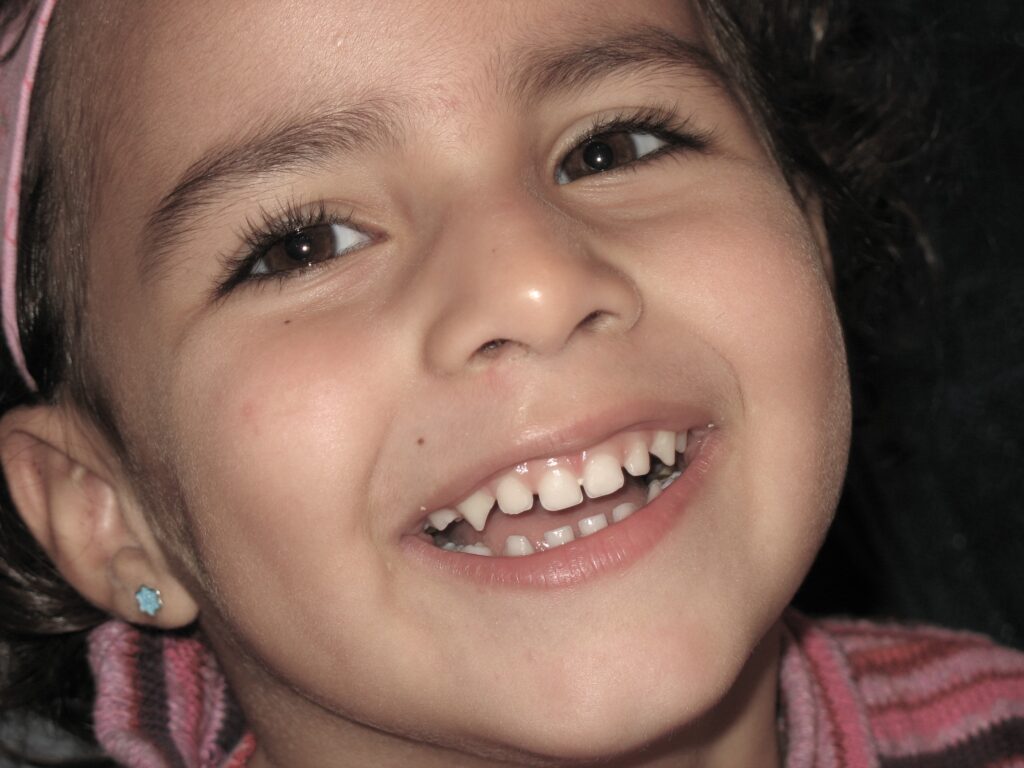
Fluoridation is a widely used process of adding fluoride to water or dental products, such as toothpaste, to help prevent tooth decay. It makes teeth stronger and protects their surface.
Fluoridation is safe and effective for children, with many studies showing that it can reduce the incidence of tooth decay in children by up to 50%. Your child’s dentist will be able to give you detailed information about fluoridation. In general, it must start between ages 2 and 3 and be repeated every 6 months. In cases of children where tooth decay is frequent, you must repeat fluoridation every 3 months according to the dentist’s instructions.
Benefits of fluoride for children:
Tooth fillings are a common dental treatment for both children and adults. The dentist uses them to repair teeth that have been damaged by decay, cracks, or fractures. In children, tooth decay is a common problem that can lead to the need for fillings.
Tooth decay happens because of the acids produced by the bacteria of the dental plaque. The acids destroy the outer surface of the tooth enamel, causing the creation of small holes, usually in between two neighboring teeth.
Treatment consists of removing the source of infection, cleaning the tooth, and placing a filling. The process of getting a filling for a child is quick and easy:
After the filling is complete, the child may experience some sensitivity or discomfort, but this should subside within a few hours.

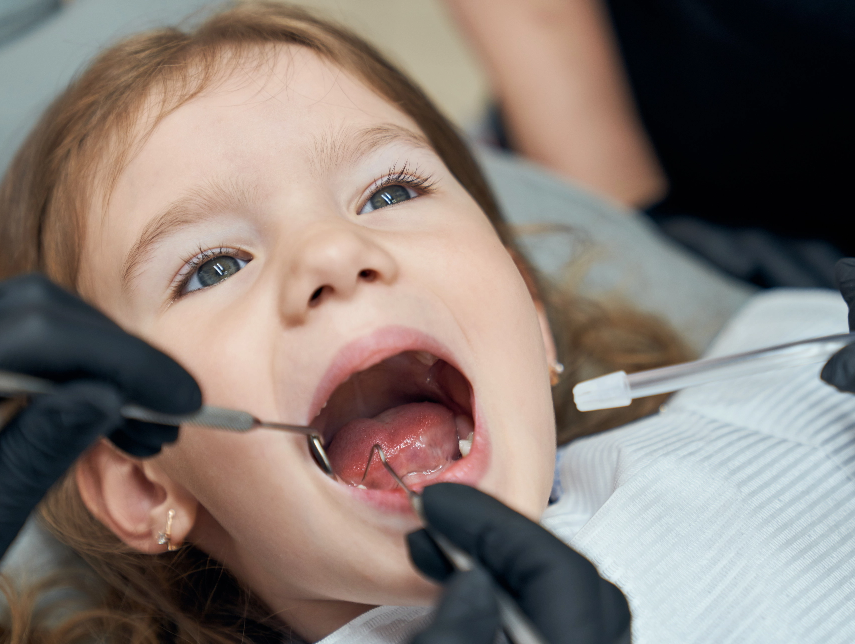
The oral cavity is inhabited by millions of bacteria that make up dental plaque. When this is accumulated more than usual, it can lead to tooth decay or inflammation of the gums. Thus, daily brushing is absolutely necessary, and so is professional dental cleaning every 6 months.
Dental cleaning takes place in two stages:
Teeth should undergo cleaning and polishing at least 1-2 times per year until age 13, whereas the first visit to the orthodontist should take place around ages 6 to 7.
In cases of destroyed teeth and teeth with abscesses where restoration is impossible, the dentist has no choice but to remove them in order to protect the oral and general health of the child. Extraction is followed by the introduction of a special device to keep the space of the tooth intact so that the permanent tooth grows in the correct position.
Here’s what you need to know about teeth extractions for kids:
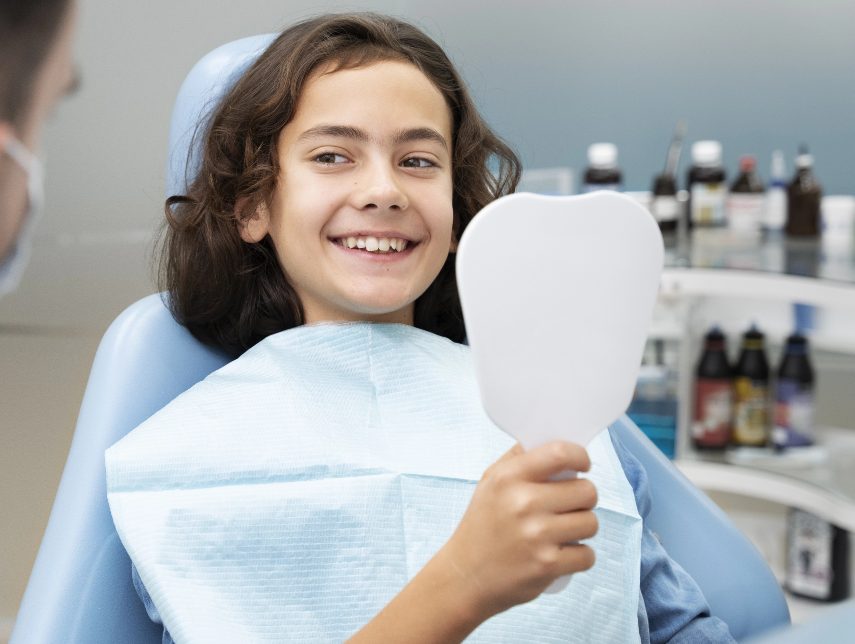
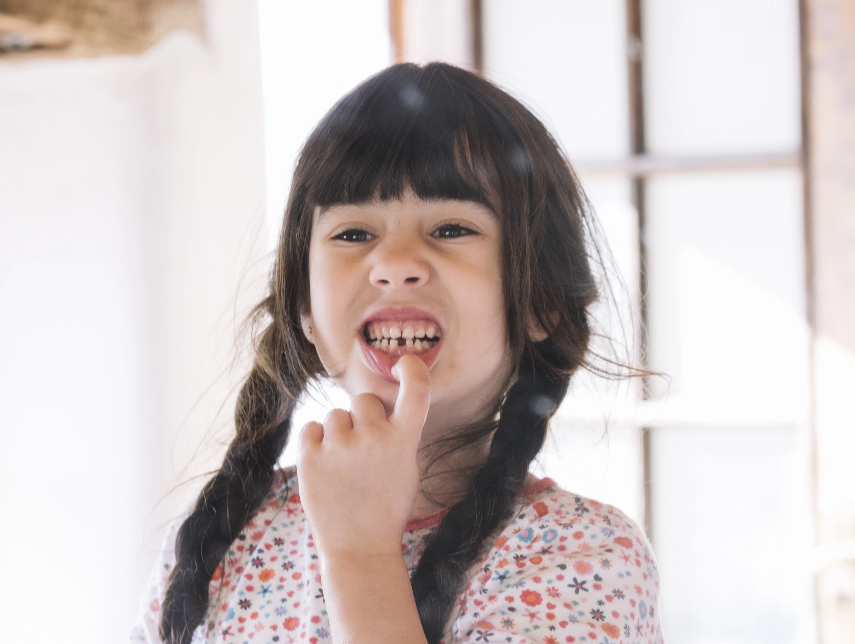
Child teeth injuries in milk or permanent teeth are common and can be quite serious. You must visit the dentist as soon as possible for a thorough evaluation after such an accident. If the injury has affected the child’s milk teeth, the situation should be assessed immediately so as to know if that may mean damage to the permanent teeth. Here are the most urgent teeth accidents in children and how to address them:
The sooner you get to the dentist (within 30-40 minutes), the more possibilities you have to save the injured tooth.
Tooth decay and gum disease are very common dental problems in children caused by inadequate or poor teeth cleaning. These two oral health problems must be taken care of as early as possible to prevent premature loss of milk teeth.
As a parent, you can help your children protect their teeth and maintain good oral health in many ways:
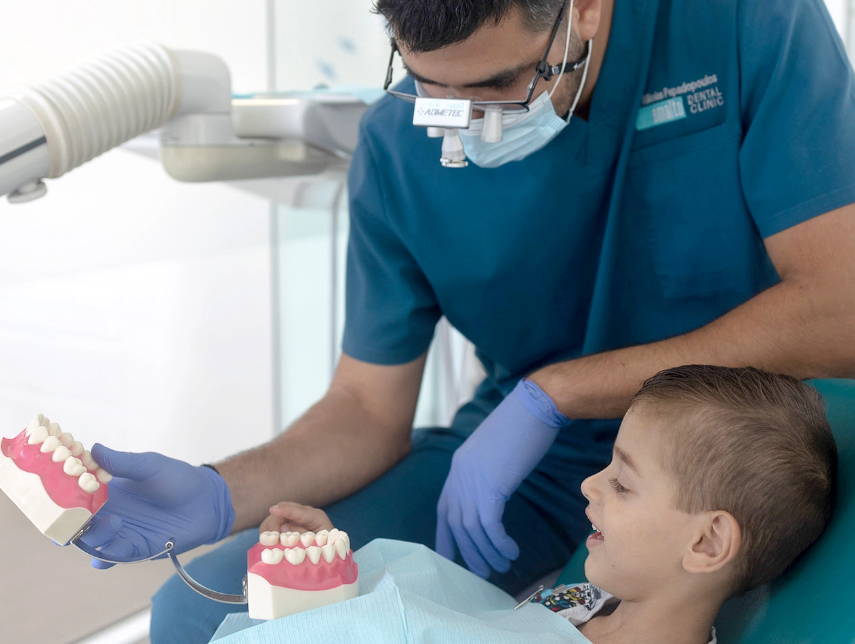
Pediatric dentists are dental specialists who focus on the oral health of infants, children, and teens. They have received specialized training and have vast experience in providing comprehensive dental care to young patients, including those with special healthcare needs.
Pediatric dentists can provide a wide range of services, such as preventive care, dental exams and cleanings, restorative treatments, orthodontics, and emergency dental care. They also educate children and their families on the importance of good oral hygiene habits and proper nutrition for maintaining healthy teeth and gums.
In addition to their clinical expertise, pediatric dentists are skilled in creating a comfortable and welcoming environment for young patients. They use child-friendly language and techniques to help children feel at ease and make the dental experience as positive as possible.
Child dentistry is significant because it helps ensure the oral health of children, which is essential for their overall health and well-being. Early dental care can prevent tooth decay and gum disease, which can lead to pain, infection, and even tooth loss.
Regular dental visits for children allow the dentist to identify and address any oral health issues early on, before they become more serious and require extensive and expensive treatments. This can help save parents and children time, money, and discomfort in the long run.
Cleaning your baby’s teeth promotes good oral health and prevents tooth decay. Here are some tips to follow:
Children should have their teeth checked by a dentist at least every six months, starting as early as 1 year old. This allows the dentist to monitor the growth and development of the child’s teeth and identify any potential problems early on.
In addition to regular dental check-ups, children can also benefit from regular cleanings to remove plaque and tartar buildup that can lead to tooth decay and gum disease. The frequency of cleanings may vary based on the child’s individual needs and risk factors.
Parents should also be aware of any changes in their child’s oral health and seek dental care if they notice signs of tooth decay or gum disease, such as cavities, toothaches, bleeding gums, or bad breath.
Yes, regular cleanings and check-ups are essential for maintaining good oral health in children.
During a scale and polish, the dentist will use special tools to remove plaque and tartar buildup from the teeth, and then polish them to remove surface stains and smooth the tooth surface. This process helps prevent tooth decay and gum disease and promotes healthy teeth and gums.
The chewing surfaces of the molar teeth have fissures, which trap bacteria and food, causing tooth decay. Due to the high consumption of sweets and improper brushing, children’s teeth are at high risk for tooth decay.
The prophylactic fissure sealants can be placed in a single visit through an easy, quick and simple procedure.
Following the eruption of the first permanent molar teeth, at the age of 6, and the eruption of the second permanent molar teeth around age 12-13 years, placing prophylactic fissures is necessary. Research has shown that teeth with sealants run 80% less possibility to suffer from tooth decay.
If your child’s milk tooth (baby tooth) is damaged, the course of treatment will depend on the severity of the damage and the stage of development of the tooth.
If the damage is minor, such as a small chip or crack, the tooth may not require any treatment and will eventually fall out as the permanent tooth grows in.
If the damage is more extensive, such as a large crack or a broken tooth, the tooth may need to be repaired or removed by the dentist.
It is important to seek immediate dental care if your child’s tooth is damaged, as untreated damage can lead to infection or other complications.
Yes, children can start visiting the dentist at age 1 or within 6 months of the eruption of their first tooth. An early dental visit is essential for establishing a baseline of your child’s oral health, detecting any early signs of tooth decay, and providing guidance on how to care for your child’s teeth and gums.
Regular dental check-ups every 6 months can help prevent tooth decay and other dental problems. It also allows the dentist to monitor the growth and development of your child’s teeth and jaw.
In addition to regular dental check-ups, it is also important to help your child establish good oral hygiene habits at home, such as brushing twice a day with toothpaste for kids and limiting sugary snacks and drinks.
Starting early with regular dental visits and good oral hygiene habits helps ensure your child has a healthy smile for life.